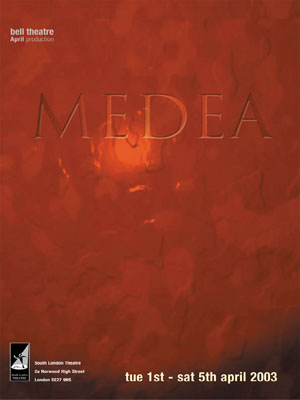Difference between revisions of "Medea (2003)"
(Cast added) |
|||
| Line 10: | Line 10: | ||
== Introduction == | == Introduction == | ||
| − | ''Medea'' tells an ancient and horrific tale with startling immediacy. As the play opens we are instantly pitched into the midst of a family in crisis. To her | + | ''Medea'' tells an ancient and horrific tale with startling immediacy. As the play opens we are instantly pitched into the midst of a family in crisis. To her mistress's screams of anguish offstage, Medea's nurse quickly fills in the story's background. Jason, hero of the Argonauts and the quest for the golden fleece, has abandoned Medea and their two sons and plans to marry the daughter of Creon, King of Corinth, where the family have taken refuge. From this dramatic opening unfolds a story of assured clarity and emotional complexity that make it astonishingly modern. As the women of Corinth plead with Medea for calm she finds herself increasingly isolated as both Creon and Jason savagely banish her from Corinth. Fortunately, she manages to persuade Aegeus, King of Athens, to give her sanctuary. Before leaving, however, she plans a brutal revenge on the man who has destroyed her happiness. She uses witchcraft to slaughter Creon and his daughter in an horrific fashion before murdering her own sons to ensure Jason's misery is total. |
| Line 20: | Line 20: | ||
*Messenger - [[David Green]] | *Messenger - [[David Green]] | ||
*Creon - [[Peter March]] | *Creon - [[Peter March]] | ||
| − | * Aegeus - [[Richard Watkins]] | + | *Aegeus - [[Richard Watkins]] |
*Chorus - [[Anna York]], [[Dee Fancett]], [[Maggie Kruger]], [[Sue McAleaney]] | *Chorus - [[Anna York]], [[Dee Fancett]], [[Maggie Kruger]], [[Sue McAleaney]] | ||
Revision as of 17:23, 2 June 2009

by Euripides
Directed by Matt Bartlett
Performances: Tue 1st – Sat 5th February 2003, Bell Theatre
Contents
Introduction
Medea tells an ancient and horrific tale with startling immediacy. As the play opens we are instantly pitched into the midst of a family in crisis. To her mistress's screams of anguish offstage, Medea's nurse quickly fills in the story's background. Jason, hero of the Argonauts and the quest for the golden fleece, has abandoned Medea and their two sons and plans to marry the daughter of Creon, King of Corinth, where the family have taken refuge. From this dramatic opening unfolds a story of assured clarity and emotional complexity that make it astonishingly modern. As the women of Corinth plead with Medea for calm she finds herself increasingly isolated as both Creon and Jason savagely banish her from Corinth. Fortunately, she manages to persuade Aegeus, King of Athens, to give her sanctuary. Before leaving, however, she plans a brutal revenge on the man who has destroyed her happiness. She uses witchcraft to slaughter Creon and his daughter in an horrific fashion before murdering her own sons to ensure Jason's misery is total.
Cast
- Medea - Helen Chadney
- Jason - Liam Campbell
- Nurse -
- Messenger - David Green
- Creon - Peter March
- Aegeus - Richard Watkins
- Chorus - Anna York, Dee Fancett, Maggie Kruger, Sue McAleaney
Crew
- Stage Manager - Jess Osorio
- Lighting Design - Mike Elliott
- Set Design - Stuart Draper
- Costumes - Alan Buckman
- Lighting Operator - Emma Howcutt
Reviews
Some review quotes go here
Gallery
Reminiscences and Anecdotes
Members are encouraged to write about their experiences of working on or seeing this production. Please leave your name. Anonymous entries may be deleted.
See Also
Have there been other SLT productions of this play? Link to them here.
Or add anything that is related within this site. The author's page for instance or other plays with a similar theme.
References
<references/>